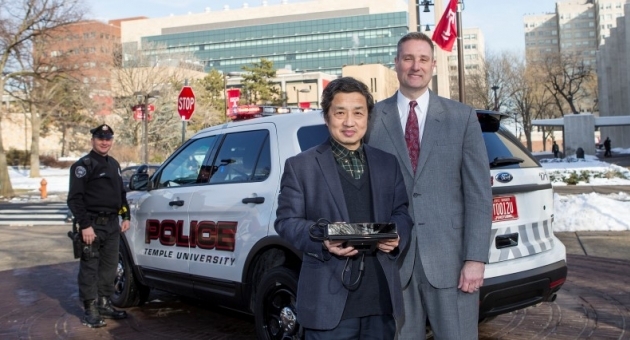Using 3-D cameras and high-speed broadband to enhance public safety

Most camera-based surveillance systems are static, providing law enforcement with limited flexibility. They also do not operate effectively when visibility is poor, such as at night or in inclement weather.
But now, thanks to a National Science Foundation–funded grant, researchers in Temple’s Department of Computer and Information Sciences (CIS) are developing a mobile surveillance camera system that will provide police officers with enhanced viewing capabilities.
Led by Jie Wu, Laura H. Carnell Professor and chair of CIS, the researchers will develop algorithms that allow for the integration of mobile 3-D cameras with cloud-based computing via wireless, high-speed broadband networks. Law enforcement will have more flexibility in deploying the cameras, as well as access to enhanced video and vital information such as facial recognition.
During the two-year pilot program, the researchers plan to field-test their new system on Temple Police vehicles. The system will allow officers to take the cameras where they are most needed, said Wu.
"Temple Campus Safety Services operates 500 cameras across its North Philadelphia campus, but those cameras are mounted on buildings and poles and at other stationary positions," said Wu. “We want to make the 3-D cameras more mobile.”
The video from the police cameras will be streamed back to the police dispatch using a combination of WiMAX, a next-generation wireless network, and WiFi. Wu is currently developing an experimental WiMAX wireless network in downtown Philadelphia, in collaboration with Drexel University, through another National Science Foundation (NSF) grant.
Temple’s NSF-funded high-performance computing cluster known as Owl’s Nest will use the researchers’ algorithms to immediately analyze the enhanced video from the 3-D cameras to provide the police with information.
Wu said the researchers also hope to provide officers with some computational abilities in the police car via laptop computers that will allow for quick analysis of a potential emergency situation.
The project is being funded through US Ignite, a federal initiative that aims to create applications for the next-generation internet that benefit and transform the public sector. “Public safety is a key strategic area of the US Ignite grants,” said Wu.
In addition to Wu, Eugene Kwatny, professor of computer and information sciences, and Chiu Tan and Haibin Ling, both assistant professors of computer and information sciences, are collaborators on the project.